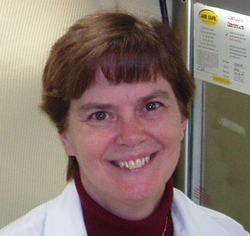 |
Debra Romberger, M.D. |
NOTE: This profile is part of a series highlighting the 26 researchers who were named UNMC Distinguished Scientists or New Investigators for 2007. Each of these researchers will be profiled in UNMC Today leading up to a March 20 ceremony to recognize their achievements.
- Name: Debra Romberger, M.D.
- Title: Professor and vice chairwoman of research in the UNMC Department of Internal Medicine and associate chief of staff of research and development at the Omaha Division of the VA Nebraska-Western Iowa Health Care System.
- Joined UNMC: 1990
- Hometown:Abilene, Kan.
Briefly describe your research in laymen terms, please.
I investigate processes that control inflammation/irritation in the lungs of people exposed to various environmental exposures with a special emphasis on agricultural-related dusts and cigarette smoke.
What led you to pursue this area of research?
I came to UNMC to do a pulmonary research fellowship in Dr. Stephen Rennard’s laboratory and was introduced to airway epithelial cell biology and mechanisms of airway injury and repair. As a pulmonary clinician, understanding what drives responses in the lung is fascinating to me. My colleague, Dr. Susanna Von Essen, has specialized in respiratory health problems important to those working in agriculture and she encouraged me to apply my interests in airway inflammation, injury and repair to this field. Both Susanna and I grew up on farms and have an interest in seeing modern farming thrive and be a healthy place for people to work.
How do you see your research contributing to science?
Although cigarette smoking is the most important cause of chronic obstructive pulmonary disease (COPD) — the fourth leading cause of death in the United States — as many as 2 percent of COPD cases are attributed to occupational exposures, including those encountered in farming. Our goal is to contribute to understanding how dusts lead to COPD and to evaluate genetic risk factors for this disease in agricultural settings. Hopefully, we can help identify targets for new treatments as well as work on strategies to help prevent disease.
Why did you become a scientist?
I find studying how processes occur in the lungs fascinating and combining the practice of medicine with scientific investigations is both challenging and fun.
What is your hope for the next generation of scientists?
I hope that my generation provides opportunities, resources and mentoring for future scientists to use their natural curiosity to address the health care needs of people world-wide and to reclaim our environment.
Beyond grant funding, how do you measure success?
I feel most successful when I am helping connect people who then help each other address their scientific questions and when I am helping create a supportive environment for students, trainees and faculty to use their many talents.
What would you tell a student interested in a research career?
Look for opportunities to train where you can get exposure to diverse disciplines with people who like what they are doing. Pursue a career that stimulates you — I love what I do for a living and consider that an amazing gift.
Do you have a hero/role model? If so, what do you admire most about them?
I have been blessed with great colleagues and friends. My parents could not have been more supportive of my education and my choice of careers. A central figure in my childhood was my mother’s only brother — Dr. Roy Greep — who quit school after the eighth grade to farm, was eventually convinced to go back to high school, graduated from Kansas State University, received his Ph.D. as an endocrine physiologist and became the first non-dentist to be dean of the Dental School at Harvard. He followed his scientific passions, had a rich family life with his wife and daughters, kept connected to his family back in Kansas and was active into his 90s.
Tell us about your family and hobbies outside of the lab.
My parents and brothers live in Kansas and my nieces (and now their families) are central people in my life. I am active in my church (First United Methodist) and I enjoy movies, performing arts, bicycling, traveling and drinking coffee with friends.
List three things few people know about you.
- I played flute in marching band in high school and college (Go Wildcats!)
- Growing up, I was in 4-H and showed sheep.
- My summer job in college was working in the home office of the Kansas Farm Bureau crop hail insurance department.